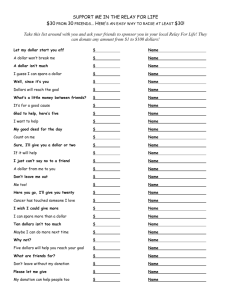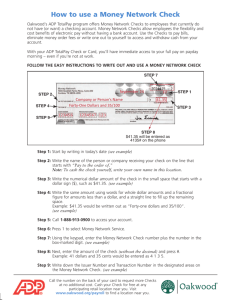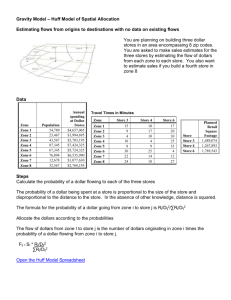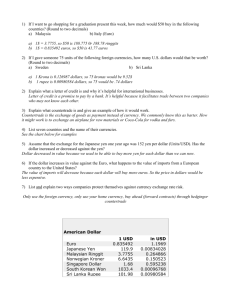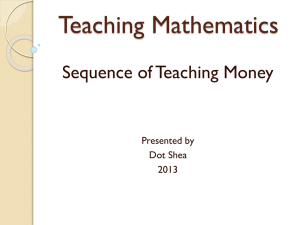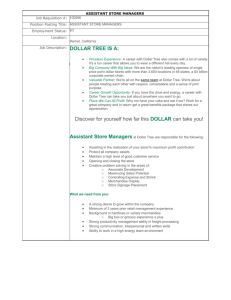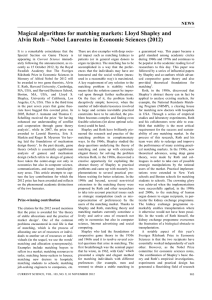International Balance of Payments: Introduction
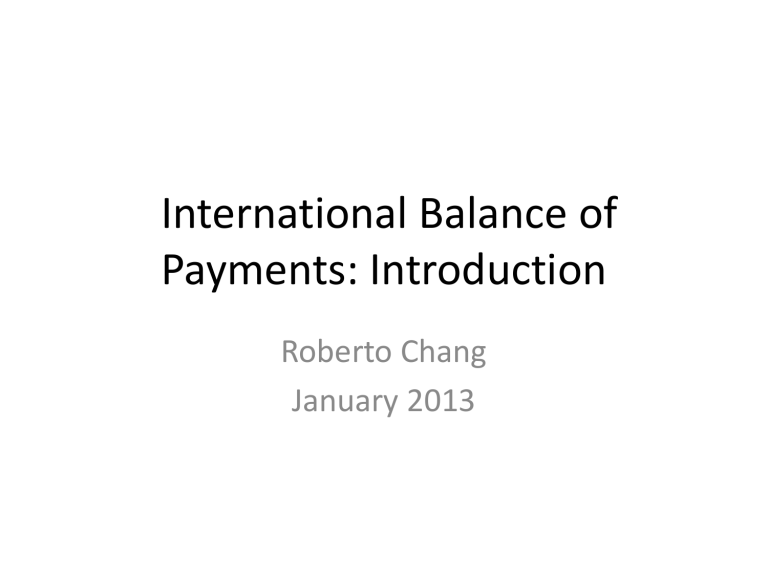
International Balance of
Payments: Introduction
Roberto Chang
January 2013
Welcome!
• International Macroeconomics is one of the most exciting and lively subjects in Economics
• Related to a host of important real world problems
• And some other that are not as obviously important, but instructive as well
A Nobel Prize “Problem”
Or, Why Even Nobel Prize winners should take this course
The Nobel Prize Tale
• The 2012 Nobel Prize in Economics was announced on Monday October 15, 2012
• The prize, 10 million Swedish krona, was awarded on Saturday, December 8th
• The winners: Alvin Roth (Harvard) and Lloyd
Shapley (UCLA)
Why should even Roth and Shapley care about International Macro?
• Presumably (since they live in the US) Roth and Shapley do not care about kronas, but about US dollars.
• In other words, they must care about the value of kronas in US dollars: the exchange
rate.
The krona-dollar exchange rate
• October 15, 2012: 1 US dollar = 6.70 kronas
• End of May: 1 US dollar = 7.26 kronas
The US dollar depreciated or became weaker against the krona.
The krona appreciated against the dollar.
The Nobel Award, in dollars
• October 15 (announcement date): 10,000,000 kronas/6.70 kronas per dollar = 1,492,537 dollars
• At May exchange rate: 10,000,000 kronas/7.26 kronas per dollar = 1,377,410 dollars
In the four months before the announcement, the dollar value of the prize increased by $ 115
126!!
What should Roth-Shapley have done?
• As you will learn in this course, it is possible to contract to purchase dollars for kronas at a given date in the future and at a fixed (e.g. locked in advance) rate
• The agreed upon rate is called a forward rate
• So RS could have “locked” the dollar value of their prize as soon as they learned they had won
Actually, why should they care?
• Why do we assume that Roth-Shapley care about the dollar value of the award, instead of the krona value?
• Answer: Presumably, the dollar prices of goods they care about are fixed in dollars, at least in the short run.
• The importance and implications of such
nominal rigidities will be a substantial part of this course.
Course Content, Logistics, etc.
Contents
• A lot of interesting stuff
• Exchange Rates
• Current Accounts and International Wealth
• Currencies
• Crises
• And on and on…
But…
• …while this course is for you…
• …I expect you to work hard…
• …to learn and apply the technical apparatus needed to think about these problems as an economist
Prerequisites
• Intermediate Macro
• Econometrics
• And their prerequisites
• I will not refrain from derivatives, t-statistics, etc. if needed
Main Text
• International Macroeconomics by Rob
Feenstra and Alan Taylor
• Second edition (2012)
• Excellent intro and useful web site
The Global Macroeconomy
Copyright © 2011 Worth Publishers· International Economics· Feenstra/Taylor, 2/e.
18 of 40
Additional text
• International Macroeconomics by Stephanie
Schmitt Grohe and Martin Uribe
• Unpublished, current version 2013 (will be available from my web site)
• More technically advanced
Additional Readings
• I will feel free to assign any supplementary material, as events or class discussion warrant
• Relevant events happen every day!
• Make a habit of reading The Economist, FT, NY
Times, WSJ… and relate what you learn here to their discussion
Formal Requirements
• Five homework sets
• First Midterm: March 11th
• Second Midterm: April 18th
• Final Exam: May 10th
• Homeworks: 10%
Grades
• If final grade is lower than the average of two midterms, each exam counts for 30% of grade
• If not, final is 50% and the best of midterms for 40%
• Hence, no make ups!
Office Hours, etc.
• My regular office hours: Thursdays 2:30-4:00, or by appointment
• Announcements, materials, etc. will be posted in my web page
Next Class
• Please read chapters 1 and 2 of FT
